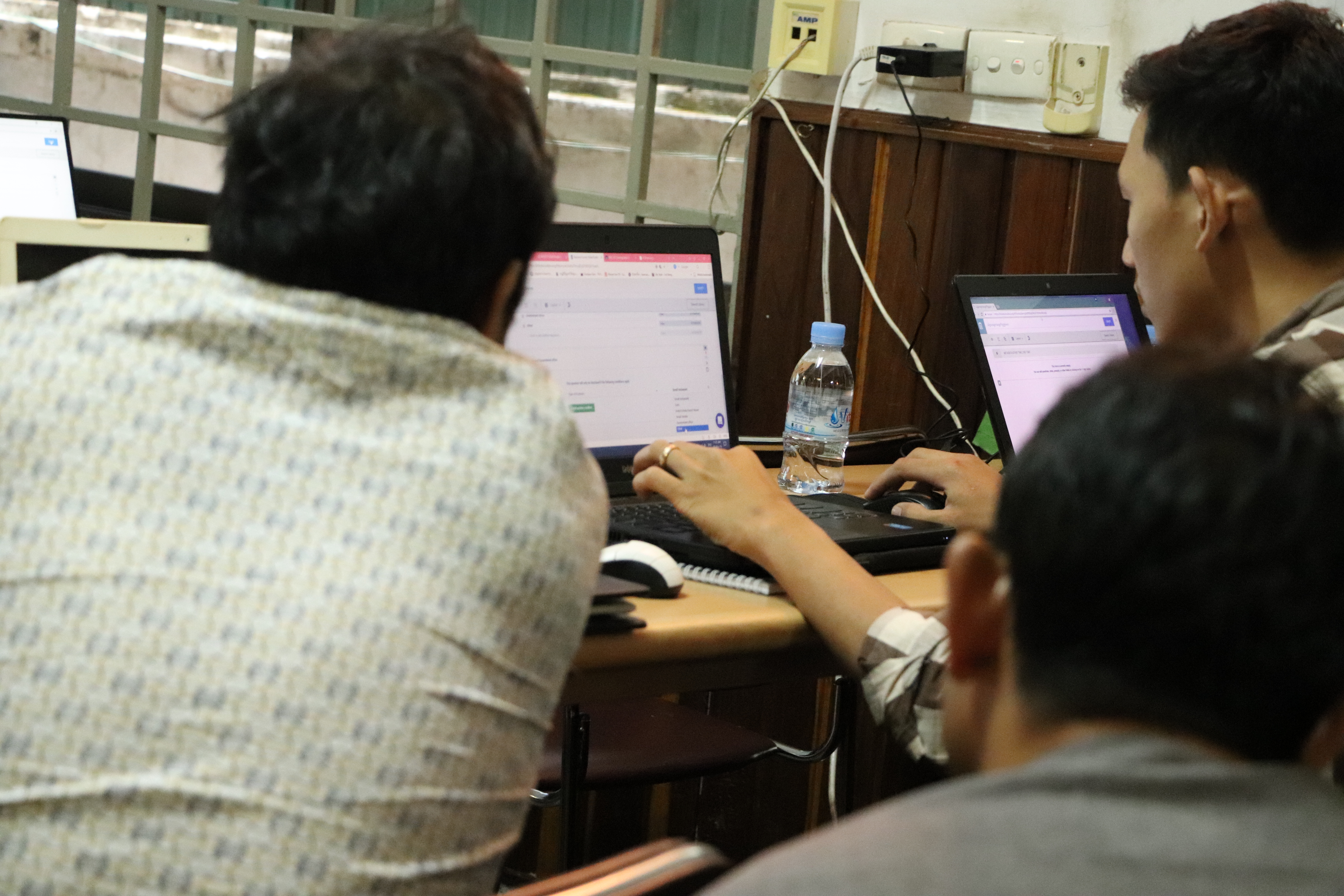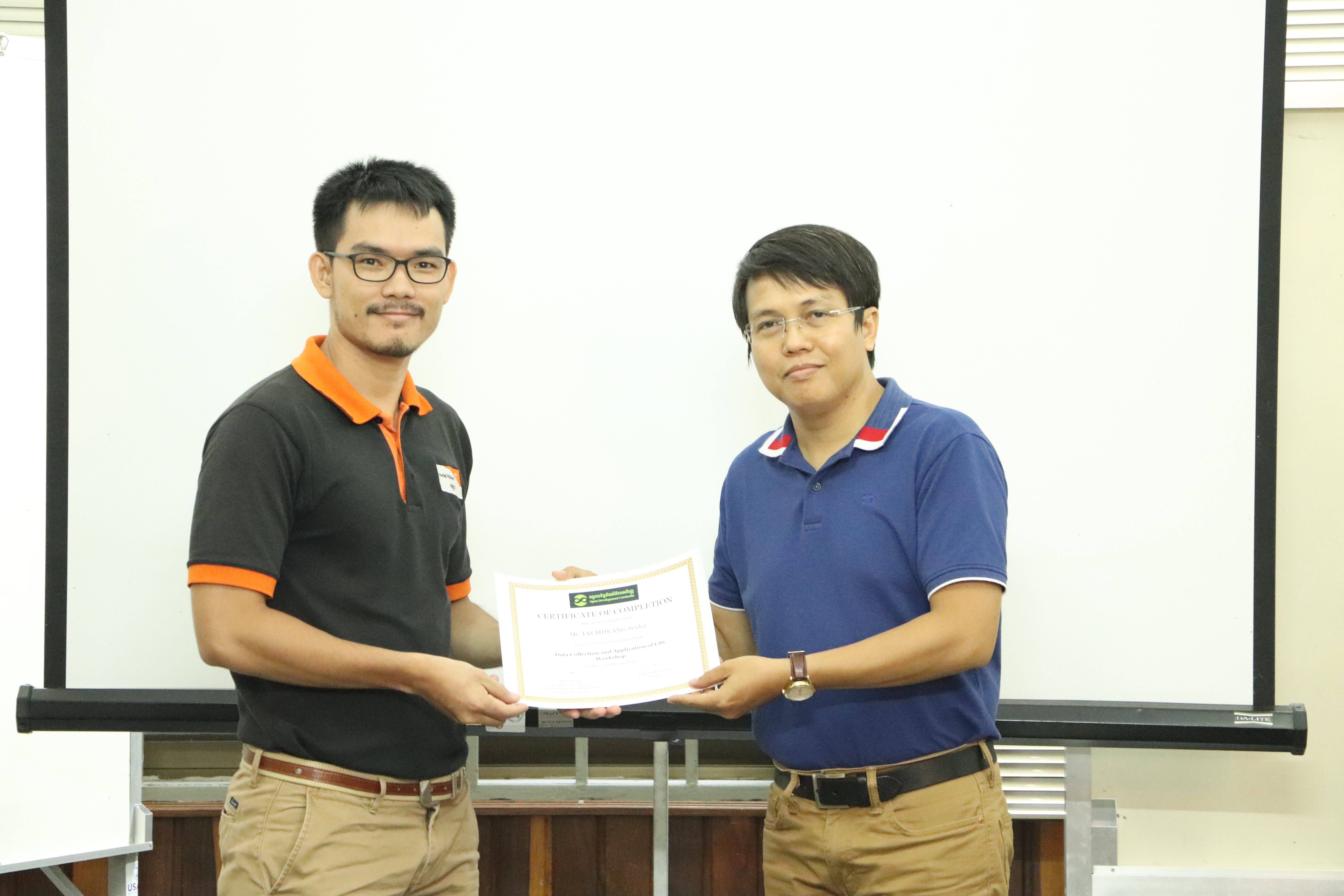សិក្ខាសាលាជីអាយអេស លើកទី២របស់អូឌីស៊ី៖ ការប្រមូលទិន្នន័យ និងកម្មវិធីជីអាយអេស
នៅក្នុងប្លក់មុន យើងរៀបរាប់នៅក្នុងស៊េរីប្លក់អំពីសកម្មភាព និងលទ្ធផលជោគជ័យរបស់សិក្ខាកាមចំនួន ២៤ នាក់ ដែលបានចូលរួម និងទទួលបានវិញ្ញាបនបត្រ នៅក្នុងសិក្ខាសាលាចំនួន បី ថ្ងៃ។ បន្ទាប់ពីបានបង្ហាត់ពីមូលដ្ឋានគ្រឹះនៃប្រព័ន្ធព័ត៌មានភូមិសាស្ត្រ ដែលប្រើប្រាស់ជាមួយនឹងកម្មវិធី QGIS រួចមក ពេលនេះសិក្ខាសាលានឹងផ្តោតលើការប្រមូលទិន្នន័យ និងការប្រើប្រាស់ជីអាយអេស (GIS)។
នៅក្នុងរយៈពេល បី ថ្ងៃ ចាប់ពីថ្ងៃទី ០៧ ទៅថ្ងៃទី ០៩ ខែឧសភា ស្ថិតនៅការិយាល័យអូឌីស៊ី ក្នុងរាជធានីភ្នំពេញ សិក្ខាកាមចំនួន ២១ នាក់ ដែលកំពុងធ្វើការនៅក្នុងរាជរដ្ឋាភិបាល វិស័យឯកជន ស្ថាប័នអង្គការមិនមែនរដ្ឋាភិបាល និងសាកលវិទ្យាល័យនានា រួមមានដូចជា ក្រសួងរ៉ែ និងថាមពល ក្រសួងផែនការ ក្រុមហ៊ុនSmarter Solutions ក្រុមហ៊ុនSustinat Green ក្រុមហ៊ុនRising Phoenix ក្រុមហ៊ុនGreen Environment Group វិទ្យាស្ថានគ្រប់គ្រងបស្ចិមបូព៌ា (EWMI) មូលនិធិ Maddox Jolie Pitt អង្គការសម្ព័ន្ធភាពដើម្បីការអភិរក្សធនធានជលផល (FACT) អង្គការសមាគមខ្មែរលើ អង្គការជីវិតសត្វស្លាបអន្តរជាតិប្រចាំកម្ពុជា សាកលវិទ្យាល័យភូមិន្ទភ្នំពេញ អង្គការទស្សនៈពិភពលោកកម្ពុជា វិទ្យាស្ថានបច្ចេកវិទ្យាកម្ពុជា និងអង្គការទិន្នន័យអំពីការអភិវឌ្ឍ បានសិក្សាពីរបៀបប្រើប្រាស់កម្មវិធីជីអាយអេស និងកម្មវិធីបើកទូលាយសម្រាប់ការប្រមូលទិន្នន័យ។ ក្នុងអំឡុងពេលសិក្ខានេះ តំបន់បឹងទន្លេសាប និងការគ្រប់គ្រងធនធានធម្មជាតិ និងការគ្រប់គ្រងគ្រោះមហន្តរាយ ត្រូវបានប្រើជាប្រធានបទសំខាន់សម្រាប់ការពិភាក្សា និងការសិក្សា។
ថ្ងៃដំបូងនៃសិក្ខាសាលានេះ បានចាប់ផ្តើមជាមួយនឹងការវាយតម្លៃកម្រិតចំណេះដឹង ផ្នែកជីអាយអេសរបស់សិក្ខាកាមដែលបានចូលរួមទាំងអស់ ហើយប្រធានបទបន្ទាប់គឺមូលដ្ឋានគ្រឹះនៃការប្រមូលទិន្នន័យ តាមរយៈការធ្វើបទបង្ហាញដ៏ក្បោះក្បាយ។ បន្ទាប់មក សិក្ខាកាមទាំងអស់ត្រូវបានណែនាំឱ្យតំឡើងកម្មវិធី KoBoToolbox ដែលជាកម្មវិធីប្រភពបើកចំហ សម្រាប់ការប្រមូលទិន្នន័យ ហើយត្រូវបានប្រើប្រាស់ដោយអង្គការល្បីៗ ជាច្រើន។ ដើម្បីឱ្យវគ្គបណ្តុះបណ្តាលនេះទទួលបានជោគជ័យ វាមានសារៈសំខាន់ណាស់ ក្នុងការឱ្យអ្នកចូលរួមយល់អំពីមូលដ្ឋានគ្រឹះនៃឧបករណ៍ប្រមូលទិន្នន័យនីមួយៗ ដើម្បីអាចបង្កើតទម្រង់សំណួរផ្សេងៗ។
ការប្រមូលទិន្នន័យ និងកម្មវិធីជីអាយអេស ក្នុងការគ្រប់គ្រងធនធានធម្មជាតិគឺជាប្រធានបទសំខាន់នៃថ្ងៃទី ពីរ ដែលរួមបញ្ចូលការបង្ហាញអន្តរកម្មជាច្រើន ក៏ដូចជាការប្រមូលទិន្នន័យនៅទីវាល ដែលអ្នកចូលរួមអាចយល់ដឹងបន្ថែមអំពីរបៀបប្រើប្រាស់ទិន្នន័យនៅក្នុង QGIS ។ សិក្ខាកាមបានសិក្សាពីវិធីគ្រប់គ្រងទិន្នន័យ វិភាគទិន្នន័យនៅលើគេហទំព័រ និងបញ្ចេញទិន្នន័យសម្រាប់ការវិភាគនៅកម្មវិធីផ្សេងៗទៀត។ បន្ទាប់ពីសម្រាកអាហារថ្ងៃត្រង់រួច សិក្ខាកាមនេះបានផ្តោតទៅលើការប្រើប្រាស់កម្មវិធីជីអាយអេស នៅក្នុងការគ្រប់គ្រងធនធានធម្មជាតិ តាមរយៈសេចក្តីណែនាំនៃការវិភាគទិន្នន័យព័ត៌មានភូមិសាស្ត្រ និងពិជគណិតផែនទី។ នៅចុងបញ្ចប់ អ្នកចូលរួមមានការរំភើបក្នុងការធ្វើការលើគម្រោងជាក់ស្តែងមួយ ដែលប្រធានបទនិយាយអំពី៖ សាលារៀនដែលរងផលប៉ះពាល់នៅតំបន់ដែលងាយរងគ្រោះដោយទឹកជំនន់ នៅជុំវិញបឹងទន្លេសាប។ នៅថ្ងៃចុងក្រោយនៃសិក្ខាសាលាត្រូវបានបន្តទៅលើការអនុវត្ត ជីអាយអេស ក្នុងការគ្រប់គ្រងធនធានធម្មជាតិ ប៉ុន្តែលើកនេះគឺផ្តោតលើការណែនាំអំពីការវិភាគគោលពីរ និងការគ្រប់គ្រងទឹកជំនន់។
សិក្ខាសាលារយៈពេល បី ថ្ងៃនេះ បានទទួលលទ្ធផលសំខាន់ៗ។ អ្នកចូលរួម ភាគច្រើនបាននិយាយថា ពួកគាត់យល់ឃើញថា សិក្ខាសាលាស្ដីពីជីអាយអេស (GIS) របស់អូឌីស៊ីនេះ មានភាពគួរឱ្យចាប់អារម្មណ៍ មិនត្រឹមតែអាចសិក្សាអំពីរបៀបប្រើប្រាស់កម្មវិធីជីអាយអេស ប៉ុណ្ណោះទេ ប៉ុន្តែថែមទាំងទទួលបាននូវចំណេះដឹងទូលំទូលាយលើការគ្រប់គ្រងធនធានធម្មជាតិ និងការគ្រប់គ្រងគ្រោះមហន្តរាយផងដែរ។ អ្នកចូលរួមទាំងអស់បានទទួលវិញ្ញាបនបត្រ នៅថ្ងៃចុងបញ្ចប់នៃសិក្ខាសាលា ដែលជាភស្តុតាងបង្ហាញថា ពួកគាត់បានបញ្ចប់វគ្គសិក្សាដោយជោគជ័យ ហើយបានទទួលចំណេះដឹង និងជំនាញអំពីការប្រើប្រាស់កម្មវិធីជីអាយអេស និងការប្រមូលទិន្នន័យចល័ត។ ដោយផ្អែកលើមតិយោបល់នៅក្នុងទម្រង់រង្វាយតម្លៃ អ្នកចូលរួមភាគច្រើនប្រាកដក្នុងចិត្តថា ពួកគាត់អាចប្រើប្រាស់ជំនាញទាំងនេះ នៅក្នុងអាជីពរបស់ពួកគាត់បាន ហើយបានអះអាងអំពីសារៈប្រយោជន៍នៃសិក្ខាសាលារយៈពេលបីថ្ងៃនេះទៀតផង។ លោក លីឈាង សីហា បុគ្គលិកអង្គការទស្សនៈពិភពលោកកម្ពុជាបានសរសេរថា «សិក្ខាសាលានេះមានអត្ថប្រយោជន៍ណាស់សម្រាប់ខ្ញុំ ក្នុងការអនុវត្តគម្រោងរៀបចំរបស់ខ្ញុំ ហើយខ្ញុំនឹងចែករំលែកមេរៀនទាំងនេះដល់មិត្តរួមការងាររបស់ខ្ញុំ។» បន្ទាប់ពីសិក្ខាសាលានេះ គាត់នឹងប្រើប្រាស់ចំណេះដឹងក្នុងការប្រមូលទិន្នន័យអំពីសេវាទឹកស្អាត និងអនាម័យ (WASH) និងដើម្បីផលិតផែនទី GIS សម្រាប់អង្គការរបស់គាត់។ លើសពីនេះទៀត លោក ជា សុភា មកពីអង្គការជីវិតសត្វស្លាបអន្តរជាតិប្រចាំកម្ពុជា និងលោក ហួ ប៉ុក មកពីក្រុមហ៊ុន Rising Phoenix បានលើកឡើងថា ពួកគាត់មានភាពសប្បាយរីករាយណាស់ដែលបានចូលរួមសិក្ខាសាលានេះ ពីព្រោះពួកគាត់បានយល់ដឹងអំពីទំនាក់ទំនងរវាងបរិស្ថាន និងកម្មវិធីជីអាយអេស។ ក្រៅពីនេះ សិក្ខាសាលាបានបង្កើតនូវបរិយាកាសសិក្សានៅលើទម្រង់ជាគេហទំព័រ ឬប្រព័ន្ធគ្រប់គ្រងការរៀនសូត្រ (LMS) ជាមួយ Google Classroom ដែលត្រូវបានប្រើប្រាស់ដើម្បីបង្ហោះឯកសារសិក្សា ផ្សាភ្ជាប់សិក្ខាកាមទាំងអស់ទៅក្នុងបណ្តាញមួយ ដែលលើកទឹកចិត្តដល់ការពិភាក្សា ការចែករំលែកបទពិសោធន៍ និងរង្វង់អ្នកជំនាញនានា។ តាមរយៈប្រព័ន្ធ LMS នេះ ការធ្វើបច្ចុប្បន្នភាពណាមួយ ដែលទាក់ទងទៅនឹងសម្ភារៈសិក្សា អាចត្រូវបានផ្សព្វផ្សាយដល់អ្នកចូលរួមទាំងអស់ទាន់ពេលវេលា និងមានភាពងាយស្រួល។ លើសពីនេះទៀត សិក្ខាកាមបានរៀនពីរបៀបធ្វើបទបង្ហាញ សំណួរសាកល្បង សំណួរនៅតាមប្រព័ន្ធអ៊ីនធើណែត និងឱកាសជាច្រើនទៀត ដើម្បីសាកល្បងជម្រើសដែលកម្មវិធី QGIS ផ្តល់ឱ្យ។
ដំណឹងល្អសម្រាប់អ្នកដែលខកខានសិក្ខាសាលាចំនួនពីរលើកដំបូងរបស់យើងស្តីពីជីអាយអេស៖ នៅក្នុងខែកក្កដានឹងមានសិក្ខាសាលាចុងក្រោយមួយស្តីអំពីការប្រើប្រាស់ជីអាយអេស ក្នុងវិស័យរៀបចំដីធ្លី និងការរួមបញ្ចូលបច្ចេកវិទ្យាជីអាយអេស ទៅក្នុងវិស័យអប់រំ។ សូមរង់ចាំទទួលព័ត៌មានពិស្ដារអំពីវគ្គបណ្ដុះបណ្ដាលបន្ទាប់!





























